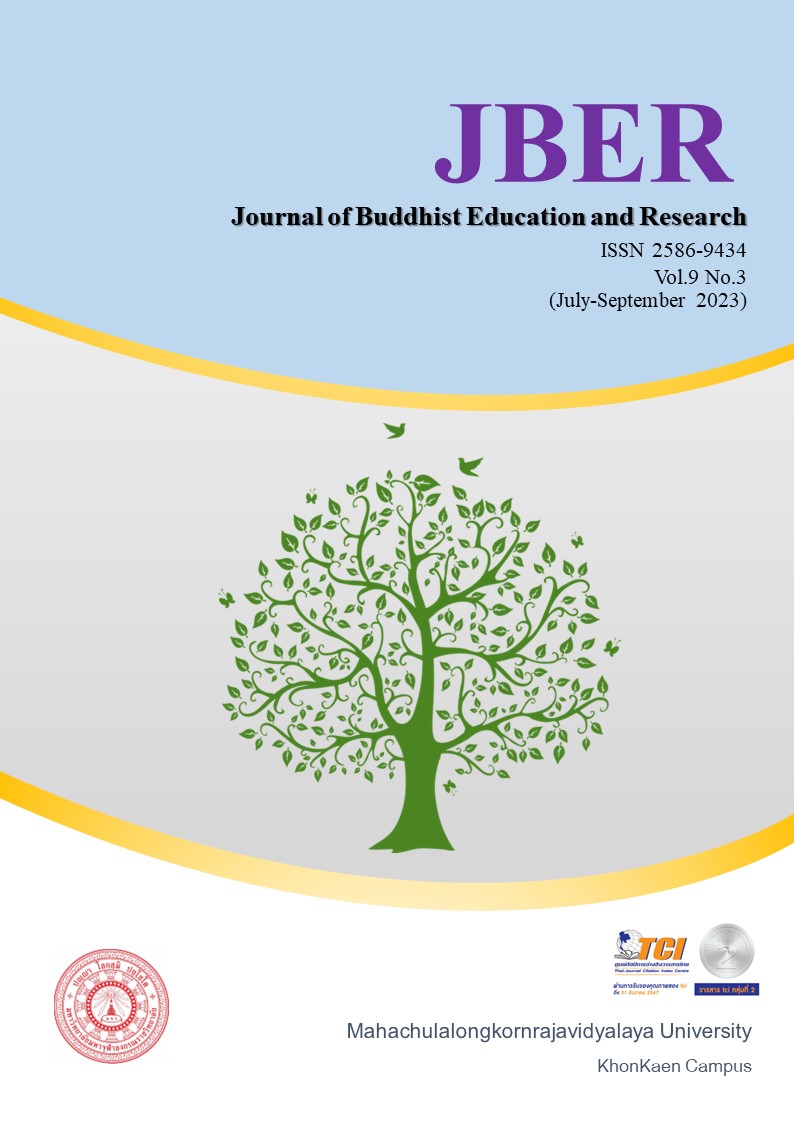The Buddhist Integration of the Five Precepts to Promote the Quality of Life in Accordance with the Sufficiency Economy Philosophy of Ban Huai Mak Lam Community, Thom Na Ngam Sub-district, Non-Sa-at District, Udon Thani Province
Keywords:
Green supply chain management; enterprise performance; Chinese furniture manufacturerAbstract
The objectives of this research were: (1) to study the living conditions of Ban Huai Mak Lam community, Thom Na Ngam Sub-district, Non-Sa-at District, Udon Thani Province; (2) to study the five precepts in promoting livelihoods; (3) to present the Buddhist integration approach in promoting livelihoods according to the philosophy of sufficiency economy of Ban Huai Mak Lam community. This study was qualitative research by studying documents, related research, and interviews to collect data from the target group of 15 key informants. The research results were as follows: 1) The living conditions of Ban Huai Mak Lam community: the people of Huai Mak Lam Village are united. Most people in the area are engaged in agriculture but lack principles in life such as not fully complying with the Five Precepts, spending extravagantly, being caught up in vices, and lacking knowledge of how to live a life of sufficiency. 2) The five precepts in promoting the livelihoods of Ban Huai Mak Lam community: refraining from killing animals is the creation of compassion. Refraining from stealing someone else's possession shows satisfaction with one’s assets. Abstaining from sexual misconduct helps to be satisfied with one's spouse. Refraining from telling lies encourages self-improvement in terms of reliability. Abstinence from alcohol drinking encourages people to be conscious and prudent. 3) The Buddhist integration approach in promoting livelihoods according to the philosophy of sufficiency economy of Ban Huai Mak Lam community: villagers should abide by the Five Precepts: (1) refrain from killing; (2) abstaining from stealing; (3) abstaining from sexual misconduct; (4) abstaining from lying; (5) abstaining from intoxicating drinks under the framework of the Sufficiency Economy Philosophy: moderation, reasonableness, and immunity.
References
ธนยศ วลัยกนก. (2562). การพัฒนาคุณภาพชีวิตตามหลักปรัชญาเศรษฐกิจพอเพียงในยุคไทยแลนด์ 4.0 ของประชาชนในเขตพื้นที่ภาคกลาง. บัณฑิตศึกษาปริทรรศน์ วิทยาลัยสงฆ์นครสวรรค์, 7(2), 45-67.
นัดพลพิชัย ดุลยวาทิต, และ มนต์ทนา คงแก้ว. (2563). การน้อมนำหลักปรัชญาเศรษฐกิจพอเพียงสู่การปฏิบัติของหัวหน้าครัวเรือนเพื่อยกระดับสู่การเป็นหมู่บ้านเศรษฐกิจพอเพียงต้นแบบ กรณีศึกษาตำบลเกาะยอ อำเภอเมืองสงขลา จังหวัดสงขลา. วารสารบริหารธุรกิจเทคโนโลยีมหานคร, 17(2), 75-90.
พระไพศาล วิสาโล. (2529). อำนาจและยุทธวิธีไร้ความรุนแรง. กรุงเทพมหานคร: โรงพิมพ์จุฬาลงกรณ์มหาวิทยาลัย.
พระครูวินัยธรเอนก เตชวโร (ใยอินทร์), และคณะ. (2560). การบริหารโครงการหมู่บ้านรักษาศีล 5 เพื่อสร้างวัฒนธรรมการอยู่ร่วมกันของชุมชนต้นแบบภาคเหนือตอนล่าง. วารสาร มจร สังคมศาสตร์ปริทรรศน์, 6(2), 1-15.
พระประพันธ์ศักดิ์ ธีรธมฺโม. (2560). การนำศีล 5 ไปใช้ในชีวิตประจำวันเพื่อส่งเสริมจริยธรรมของนักเรียนระดับชั้นมัธยมศึกษาโรงเรียนหนองแค (สรกิจพิทยา) จังหวัดสระบุรี. วารสาร มจร พุทธปัญญาปริทรรศน์, 2(1), 95-110.
ศิริ ฮามสุโพธิ์. (2542). ประชากรกับการพัฒนาคุณภาพชีวิต. กรุงเทพมหานคร: โอ.เอส. พริ้นติ้งเฮ้าส์.
ศักดิ์ชาย มงคลเคหา. (2561). ผลสัมฤทธิ์ของโครงการหมู่บ้านรักษาศีล 5 กรณีศึกษาอำเภอเมือง จังหวัดเลย. วารสารวิชาการมหาวิทยาลัยปทุมธานี, 1(1), 15-30.
สุทธิพร บุญส่ง. (2552). คุณธรรมจริยธรรมกับการพัฒนาคุณภาพชีวิต (พิมพ์ครั้งที่ 3). กรุงเทพมหานคร: ทริปเพิ่ลเอ็ดดูเคชั่น.
องฺ.นวก. (ไทย) 23/28/490.
สำนักงานคณะกรรมการการศึกษาขั้นพื้นฐาน. (2565, กุมภาพันธ์ 9). ที่ ศธ 04006/ว369 หนังสือราชการ เรื่องจุดเน้นของสำนักงานคณะกรรมการการศึกษาขั้นพื้นฐาน ประจำปีงบประมาณ พ.ศ. 2565.
สำนักงานเลขาธิการสภาการศึกษา. (2564). รายงานผลการศึกษาภาวะถดถอยทางการเรียนรู้ของผู้เรียนระดับการศึกษาขั้นพื้นฐานในสถานการณ์โควิด-19: สภาพการณ์บทเรียน และแนวทางการพัฒนาคุณภาพการเรียนรู้. สืบค้นจาก http://www.onec.go.th/th.php/book/BookView/1932.
สำนักงานเลขานุการของคณะกรรมการยุทธศาสตร์ชาติ. (2561). ยุทธศาสตร์ชาติ พ.ศ. 2561–2580. กรุงเทพมหานคร: สำนักงานเลขานุการของคณะกรรมการยุทธศาสตร์ชาติ สำนักงานคณะกรรมการพัฒนาการเศรษฐกิจและสังคมแห่งชาติ.
สัมภาษณ์ พระครูบูรพาสารสุนทร, เจ้าคณะตำบลทมนางาม, วันที่ 10 พฤศจิกายน 2564.
สัมภาษณ์ นายเภา ยาท้าว, ผู้ใหญ่บ้าน, วันที่ 1 พฤศจิกายน 2564.
สัมภาษณ์ นายณรงค์ หงษ์ทอง, ผู้ช่วยผู้ใหญ่บ้าน, วันที่ 1 พฤศจิกายน 2564.
สัมภาษณ์ นายสุชาติ โสภีร์, ปราชญ์ชาวบ้าน, วันที่ 5 พฤศจิกายน 2564.
สัมภาษณ์ ด.ต.กิตติสัณห์ เกษสีมาปภัสร์, ปราชญ์ชาวบ้าน, วันที่ 5 พฤศจิกายน 2564.
สัมภาษณ์ นางกมลชนก ช่วยนา, ส.อบต.ทมนางาม, วันที่ 7 พฤศจิกายน 2564.
สัมภาษณ์ นางสมใจ แข็งฤทธิ์, ผู้ช่วยผู้ใหญ่บ้าน, วันที่ 7 พฤศจิกายน 2564.
สัมภาษณ์ นางสม หลงสิม, ชาวบ้าน, วันที่ 10 พฤศจิกายน 2564.
สัมภาษณ์ นางสายชล เผ้าหอม, ชาวบ้าน, วันที่ 10 พฤศจิกายน 2564.
สัมภาษณ์ นายสาคร เที่ยงธรรม, ชาวบ้าน, วันที่ 10 พฤศจิกายน 2564.
Downloads
Published
How to Cite
Issue
Section
License

This work is licensed under a Creative Commons Attribution-NonCommercial-NoDerivatives 4.0 International License.





